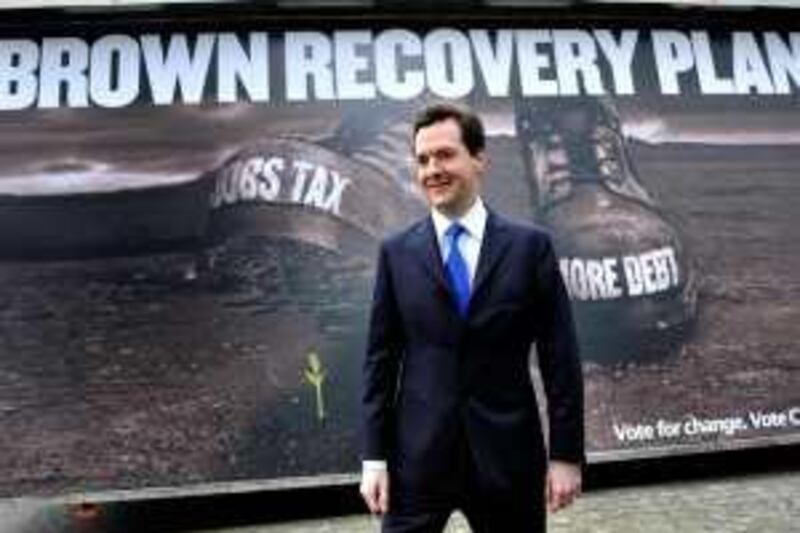LONDON // Gordon Brown, the prime minister, is expected to announce today that a general election will be held in Britain in a month's time. In what promises to be a campaign dominated by an ailing economy - spiced up with more personal attacks than the British have been used to in recent years - Mr Brown will ask the Queen to dissolve parliament and set May 6 as polling day.
Only a few months ago, an election looked likely to be little more than a victory procession for the Conservatives, the main opposition party led by David Cameron. But, since the beginning of the year, Mr Brown's Labour Party has managed to make inroads into the Tories' lead. As the Financial Times commented yesterday: "Labour should be dead. It is led by an uncharismatic man who can be blamed for the recession.
"It is also out of ideas. Parties with thoughts to spare do not suggest introducing mandatory dog insurance during election campaigns. As many as 68 per cent of voters think it is time for a change. "But Labour clings to life. The Conservatives enjoy a lead of only eight points [and] a hung parliament still a possible outcome." Mr Brown yesterday aired what amounted to his first election podcast and chose to invoke the name of Wayne Rooney, the injured, Manchester United footballer on whose recovery hinge many of England's hopes in this summer's World Cup.
Branding Conservative plans to cut public spending as a threat to economic recovery, Mr Brown said that "after an injury, you need support to recover. If you withdraw support too early, you risk doing more damage". Linking the country's most popular football player to the political battle ahead was, of course, a complete non sequitur and exemplified Labour's continuing attempts to endow Mr Brown with the populist appeal he lacks.
Mr Cameron, on the other hand, has been rather more successful as portraying himself as a man of the people, even though he comes from a highly privileged background and was educated among the "toffs" at Eton and Oxford. However, he has seen his party's double-digit lead in the opinion polls eroded over recent months amid public uncertainty over the Tories' vague plans to boost the economy. Mr Cameron now fears that there could be a hung parliament, with the third-place Liberal Democrats holding the balance of power.
"It is a challenge," he told Sky TV. "It is a tight election. It is going to be very close. We are fighting for an overall majority, we think that would be best for Britain. We think a hung parliament would be damaging, the uncertainty would be bad for Britain." Away from the main battleground, there are some intriguing political questions, not least on how the two right-wing parties - the British National Party (BNP) and the UK Independence Party - will fare.
Both have avowedly anti-immigration, anti-EU and anti-Muslim agendas and attracted considerable support in the last elections to the European parliament. Over the weekend, however, both got the sort of publicity they did not want, with the BNP's publicity head being fired after being arrested by police over alleged death threats made to Nick Griffin, the party's leader. Meanwhile, leading members of the UK Independence Party were accused of flouting the rules on political donations after being secretly recorded by an undercover reporter from the Sunday Times.
Still, both parties are expected to attract votes in constituencies where high immigration has posed employment, housing and other problems for indigenous communities. If either were to get an MP elected, alarm bells would sound throughout the political establishment. Although the public has showing growing disenchantment with the body politic since last year's disclosure that many dozens of the 646 MPs had been fiddling their parliamentary expenses, the fate of the economy appears to have resurrected interest recently.
A report yesterday from Age UK, a pensioners' charity, suggested that the "grey vote" could hold the key to victory. With older people much more likely to vote than younger people, the report said that over-55s will form a majority of voters in more than half of British constituencies. Researchers at De Montfort University found that 319 of the 632 seats in England, Scotland and Wales were likely to have "grey majorities" turning out to vote, including 94 marginal constituencies where the outcome of the poll could be determined.
Michelle Mitchell, charity director of Age UK, spelt out the issues at the top of the grey agenda. "Older people are fed up with second-class services and we will support them to demand action from their local candidates on care, age discrimination, the NHS and pensions." With the three main parties also facing strong challenges from nationalist groups in both Scotland and Wales, few political pundits are prepared to put money on what the outcome will be come May 6. @Email:dsapsted@thenational.ae






